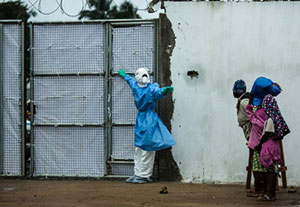NIH accelerates clinical trials of Ebola vaccines
November / December 2014 | Volume 13, Issue 6

Photo by Morgana Wingard, courtesy of USAID
The NIH is accelerating human trials of two Ebola candidate
vaccines, among other activities, to help combat the epidemic
raging in Africa.
The NIH is helping guide two front-runner Ebola vaccine candidates through early-stage human trials and, barring safety or immunity problems, may have the vaccines ready for advanced testing in African and other volunteers as early as December, according to NIH officials.
Researchers at the National Institute of Allergy and Infectious Diseases (NIAID) are evaluating a vaccine developed by Canadian scientists, called VSV-ZEBOV, for safety and its ability to generate an immune system response in healthy adults who are given two intramuscular doses. The Walter Reed Army Institute of Research is simultaneously testing the vaccine candidate as a single dose at its Clinical Trials Center in Silver Spring, Maryland.
"The need for a vaccine to protect against Ebola infection is urgent," said NIAID Director Anthony S. Fauci, M.D. "NIH welcomes the opportunity to collaborate with the U.S. Department of Defense to conduct human clinical tests of another promising - and hopefully, successful - Ebola vaccine candidate."
VSV-ZEBOV, which was developed by researchers at the Public Health Agency of Canada's National Microbiology Laboratory, has been licensed to NewLink Genetics Corporation through its wholly owned subsidiary BioProtection Systems, both based in Ames, Iowa.
Early human testing of another investigational Ebola vaccine co-developed by NIAID and GlaxoSmithKline began in early September. Initial data on safety and efficacy are expected by the end of 2014.
NIH is preparing an initial safety trial for a third vaccine candidate, from Johnson and Johnson, which could begin early next year, and is collaborating on additional vaccine projects.
"During this extremely serious outbreak of Ebola virus disease in West Africa, we must balance the urgent desire to deploy experimental countermeasures with the need to ensure safety and determine the efficacy of the products," according to a blog post co-authored by Fauci and NIH Director Dr. Francis S. Collins. "We would not want to introduce products, particularly preventive measures for healthy, uninfected individuals, if they are ineffective or even harmful."
NIH researchers are also moving ahead with studies of experimental treatments - including ZMapp, BCX4430, brincidofovir, lamivudine and others. In addition, NIH is collaborating on efforts to improve diagnostic tests to enable speedy and accurate identification of patients ill with Ebola, since their symptoms might initially mimic malaria or other infectious diseases.
More Information
To view Adobe PDF files,
download current, free accessible plug-ins from Adobe's website.